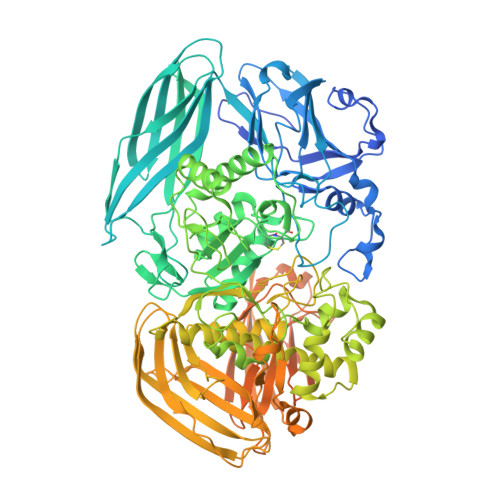The Structural Basis of Substrate Recognition in an Exo-Beta-D-Glucosaminidase Involved in Chitosan Hydrolysis.
Lammerts Van Bueren, A., Ghinet, M.G., Gregg, K., Fleury, A., Brzezinski, R., Boraston, A.B.(2009) J Mol Biology 385: 131
- PubMed: 18976664
- DOI: https://doi.org/10.1016/j.jmb.2008.10.031
- Primary Citation of Related Structures:
2VZO, 2VZS, 2VZT, 2VZU, 2VZV - PubMed Abstract:
Family 2 of the glycoside hydrolase classification is one of the largest families. Structurally characterized members of this family include enzymes with beta-galactosidase activity (Escherichia coli LacZ), beta-glucuronidase activity (Homo sapiens GusB), and beta-mannosidase activity (Bacteroides thetaiotaomicron BtMan2A). Here, we describe the structure of a family 2 glycoside hydrolase, CsxA, from Amycolatopsis orientalis that has exo-beta-D-glucosaminidase (exo-chitosanase) activity. Analysis of a product complex (1.85 A resolution) reveals a unique negatively charged pocket that specifically accommodates the nitrogen of nonreducing end glucosamine residues, allowing this enzyme to discriminate between glucose and glucosamine. This also provides structural evidence for the role of E541 as the catalytic nucleophile and D469 as the catalytic acid/base. The structures of an E541A mutant in complex with a natural beta-1,4-D-glucosamine tetrasaccharide substrate and both E541A and D469A mutants in complex with a pNP-beta-D-glucosaminide synthetic substrate provide insight into interactions in the +1 subsite of this enzyme. Overall, a comparison with the active sites of other GH2 enzymes highlights the unique architecture of the CsxA active site, which imparts specificity for its cationic substrate.
- Biochemistry and Microbiology, University of Victoria, BC, Canada.
Organizational Affiliation:

















